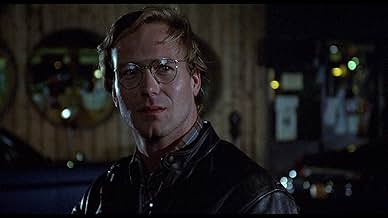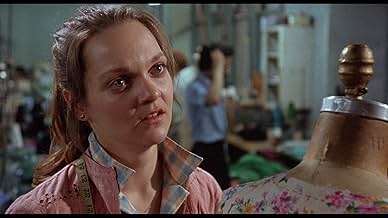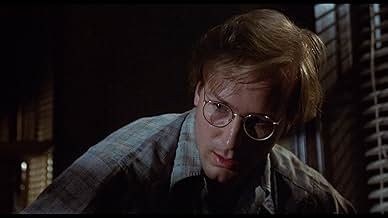NOTE IMDb
5,9/10
6,1 k
MA NOTE
Un concierge qui prétend avoir été témoin d'un meurtre entretient une relation amoureuse avec la journaliste de télévision qui couvre l'affaire.Un concierge qui prétend avoir été témoin d'un meurtre entretient une relation amoureuse avec la journaliste de télévision qui couvre l'affaire.Un concierge qui prétend avoir été témoin d'un meurtre entretient une relation amoureuse avec la journaliste de télévision qui couvre l'affaire.
- Réalisation
- Scénario
- Casting principal
Sharon Chatten
- Israeli Woman
- (as Sharon Goldman)
Avis à la une
Vietnam war hero and Manhattan janitor Daryll Deever (William Hurt) is obsessed with hard-nosed TV reporter Tony Sokolow (Sigourney Weaver). A shady Vietnamese businessman is murdered in his office building. He was complaining about Daryll's racist fellow vet coworker Aldo (James Woods). Aldo has an alibi in Daryll's girlfriend and Aldo's sister Linda (Pamela Reed). It's a lie and he's come into a lot of money. Tony investigates the story and concentrates on Daryll who secretly found the body and pretends to know something to stay close to her. Her Jewish activist boyfriend Joseph (Christopher Plummer) is hiding a secret. Police detectives Lt. Jacobs (Steven Hill) and Lt. Black (Morgan Freeman) are investigating. Mysterious Vietnamese men are watching.
There are some great actors in this. I checked this out despite never heard of it. It has lots of interesting bits. This would work better with a creepier Hurt. He's very capable and his obsession starts that way. I think Linda gets into the way and she's not a necessary character. There are little disjointed and oddly superfluous moments like his dog attacking. Then the movie takes a really outlandish turn. It's too bad because this could have been a solid simple thriller. The turn ties together two parts of the story that really has no connection to each other. It becomes flat at that point.
There are some great actors in this. I checked this out despite never heard of it. It has lots of interesting bits. This would work better with a creepier Hurt. He's very capable and his obsession starts that way. I think Linda gets into the way and she's not a necessary character. There are little disjointed and oddly superfluous moments like his dog attacking. Then the movie takes a really outlandish turn. It's too bad because this could have been a solid simple thriller. The turn ties together two parts of the story that really has no connection to each other. It becomes flat at that point.
William Hurt stars as the brooding janitor in this sub-Hitchcockian thriller directed by Peter Yates (Bullitt). No-one in the film is quite what they seem, and Hurt plays the role of ambivalent hero/anti hero intelligently. Sigourney Weaver shows what a fine actress she really is whilst Christopher Plummer adds gravitas to the proceedings. Like Benton's Still Of The Night the film is well-crafted and often intriguing. Definitely well worth watching.
Slightly offbeat murder yarn dealing with a pair of misfits who become involved in a murder which had nothing to do with either of them. This causes one of them to be targeted by an assassin who is involved in a love triangle between a woman and his intended victim. Strange film with a taut ending.
This 1981 murder thriller, from a big studio with big stars of the time, with corny vintage taglines and advertisements, is good entertainment squarely because it pays more application to its people than its story. It's indubitably set in America, from the innards of a Manhattan boiler room to the newsroom of a TV station, even though it's about such real, involved, curious, and occasionally hilarious people that it have got to at the least be transatlantic.
This underrated neo-noir stars William Hurt as a janitor who happens upon proof that could lead to the conclusion of a murder investigation. But he doesn't go to the police with it because he's too reticent, too reflective, too doubtful of what he's seen and, mainly, he's too much in love from a distance with Sigourney Weaver's TV news reporter. Perhaps he can gain her regard by giving her the inside story.
There are other dilemmas. Sigourney Weaver's fiancée is an Israeli agent played by Christopher Plummer, who is embroiled in cloak-and-dagger overseas interventions to smuggle Jews out of the Soviet Union. His plan concerns secret fees to a corrupt Vietnamese agent who has now moved to Manhattan. The other characters include James Woods, as Hurt's impetuous and short-fused best friend and recently fired colleague, and Steven Hill and Morgan Freeman as a couple of stoic cops who ponderously trace leads in the case. One of their memorably stoic quips: "When Aldo was a little boy, he must have wanted to be a suspect when he grew up."
The advancement and resolution of the murder mystery are handled rather conventionally by director Peter Yates, who made some great thrillers like The Hot Rock and Bullitt, and his screenwriter, Steve Tesich. A climactic showdown in a midtown riding stable and its barely existent denouement has a touch of every thriller from the 1980s. But what makes this movie so enjoyable is the way Yates and Tesich and their characters play against our assumptions. It shows that there really is no excuse for a lack of cutting edge or creative spirit in genre films, because this one achieves a very poised harmony of the familiar and the original, predictability and unpredictability. Genres rely upon the audience's savvy and familiarity, on the seasoning they've stengthened from seeing movies and the frame of comparable encounters from they can evoke.
Weaver is not only a TV newswoman, but also a determined pianist on the side and the dejected daughter of her oppressive parents. Hurt is not only a janitor but also an emotional introvert, an animal lover who can rhapsodize his way into Weaver's heart. Woods is not only an unhinged janitor but also the forceful advocate of a marriage between his sister and Hurt. Hurt and the sister continue the engagement because they are both too nice to tell the other one they're not in love. And as a mystery thriller, it gives us multiple conceivable suspects and resolutions to the murder it sets up as a way of misleading us until the proper time to reveal the killer.
I've seen so many thrillers that, honestly, I don't always care that much how they resolve lest they're particularly well-crafted. What I like about this buried gem is that, where it has regard for how it turns out, it has even more regard for the essence of its scenes. There's not a scene in this movie that just constitutes plot information. Every scene defines characters. And they're developed in such uncommon integrity to the way people do act that we get all the more consumed in the mystery, merely considering that we comparatively trust it could actually be real. Actually, I'm going to buckle and say that there is one tagline for this movie that is pretty good: "You're never more vulnerable than when you've seen too much."
This underrated neo-noir stars William Hurt as a janitor who happens upon proof that could lead to the conclusion of a murder investigation. But he doesn't go to the police with it because he's too reticent, too reflective, too doubtful of what he's seen and, mainly, he's too much in love from a distance with Sigourney Weaver's TV news reporter. Perhaps he can gain her regard by giving her the inside story.
There are other dilemmas. Sigourney Weaver's fiancée is an Israeli agent played by Christopher Plummer, who is embroiled in cloak-and-dagger overseas interventions to smuggle Jews out of the Soviet Union. His plan concerns secret fees to a corrupt Vietnamese agent who has now moved to Manhattan. The other characters include James Woods, as Hurt's impetuous and short-fused best friend and recently fired colleague, and Steven Hill and Morgan Freeman as a couple of stoic cops who ponderously trace leads in the case. One of their memorably stoic quips: "When Aldo was a little boy, he must have wanted to be a suspect when he grew up."
The advancement and resolution of the murder mystery are handled rather conventionally by director Peter Yates, who made some great thrillers like The Hot Rock and Bullitt, and his screenwriter, Steve Tesich. A climactic showdown in a midtown riding stable and its barely existent denouement has a touch of every thriller from the 1980s. But what makes this movie so enjoyable is the way Yates and Tesich and their characters play against our assumptions. It shows that there really is no excuse for a lack of cutting edge or creative spirit in genre films, because this one achieves a very poised harmony of the familiar and the original, predictability and unpredictability. Genres rely upon the audience's savvy and familiarity, on the seasoning they've stengthened from seeing movies and the frame of comparable encounters from they can evoke.
Weaver is not only a TV newswoman, but also a determined pianist on the side and the dejected daughter of her oppressive parents. Hurt is not only a janitor but also an emotional introvert, an animal lover who can rhapsodize his way into Weaver's heart. Woods is not only an unhinged janitor but also the forceful advocate of a marriage between his sister and Hurt. Hurt and the sister continue the engagement because they are both too nice to tell the other one they're not in love. And as a mystery thriller, it gives us multiple conceivable suspects and resolutions to the murder it sets up as a way of misleading us until the proper time to reveal the killer.
I've seen so many thrillers that, honestly, I don't always care that much how they resolve lest they're particularly well-crafted. What I like about this buried gem is that, where it has regard for how it turns out, it has even more regard for the essence of its scenes. There's not a scene in this movie that just constitutes plot information. Every scene defines characters. And they're developed in such uncommon integrity to the way people do act that we get all the more consumed in the mystery, merely considering that we comparatively trust it could actually be real. Actually, I'm going to buckle and say that there is one tagline for this movie that is pretty good: "You're never more vulnerable than when you've seen too much."
For weeks I have been looking for the perfect structure of a screenplay. This film had me in the first ten minutes because of what it set itself up to be. The structure had the camera following one principle lead, going off to meet the other principle lead, who would subsequently go off to meet the character from which the major plot developed. "Eyewitness" is a great film which showed me what I have been missing throughout my entire movie-watching career. After you meet the principle characters through following them, some kind of sub-plot, or major plot, or principle theme, will develop, and it will truly free up the entire movie. This is basically the structure of almost every independent film I have seen. Not to be missed.
Le saviez-vous
- AnecdotesSigourney Weaver's character was based on an object of infatuation that Steve Tesich had with a Washington, D.C. anchorwoman. He recorded her broadcasts and had pictures of her like William Hurt's character had in the film of Weaver. The actual anchorwoman was brought in by Peter Yates for technical support to make Weaver's character more believable.
- GaffesThere is a security camera very obviously placed in the outer office outside of where the murder takes place, yet during the investigation no mention is made of it.
However, perhaps (circa 1981) it's a closed-circuit, live feed only (no recordings made), and no one viewing the live security screens noticed anything unusual.
- Citations
Lt. Jacobs: When he was a kid, Aldo must have wanted to be a suspect when he grew up.
- Versions alternativesRuns 93 minutes long on Capacitance Electronic Disc (CED), also commonly known RCA Selectavision Videodisc.
- ConnexionsFeatured in Sneak Previews: Eyewitness/Tess/The Competition/The Dogs of War (1981)
- Bandes originalesPiano trio no. 1 in D minor, op. 49: ii. Andante con moto tranquillo
Written by Felix Mendelssohn
[Performed at the Sokolows' house concert]
Meilleurs choix
Connectez-vous pour évaluer et suivre la liste de favoris afin de recevoir des recommandations personnalisées
- How long is Eyewitness?Alimenté par Alexa
Détails
- Date de sortie
- Pays d’origine
- Langue
- Aussi connu sous le nom de
- Consigna: Matar al testigo
- Lieux de tournage
- Société de production
- Voir plus de crédits d'entreprise sur IMDbPro
Box-office
- Budget
- 8 500 000 $US (estimé)
- Montant brut aux États-Unis et au Canada
- 6 400 000 $US
- Montant brut mondial
- 6 400 000 $US
Contribuer à cette page
Suggérer une modification ou ajouter du contenu manquant

Lacune principale
By what name was L'oeil du témoin (1981) officially released in India in English?
Répondre





















